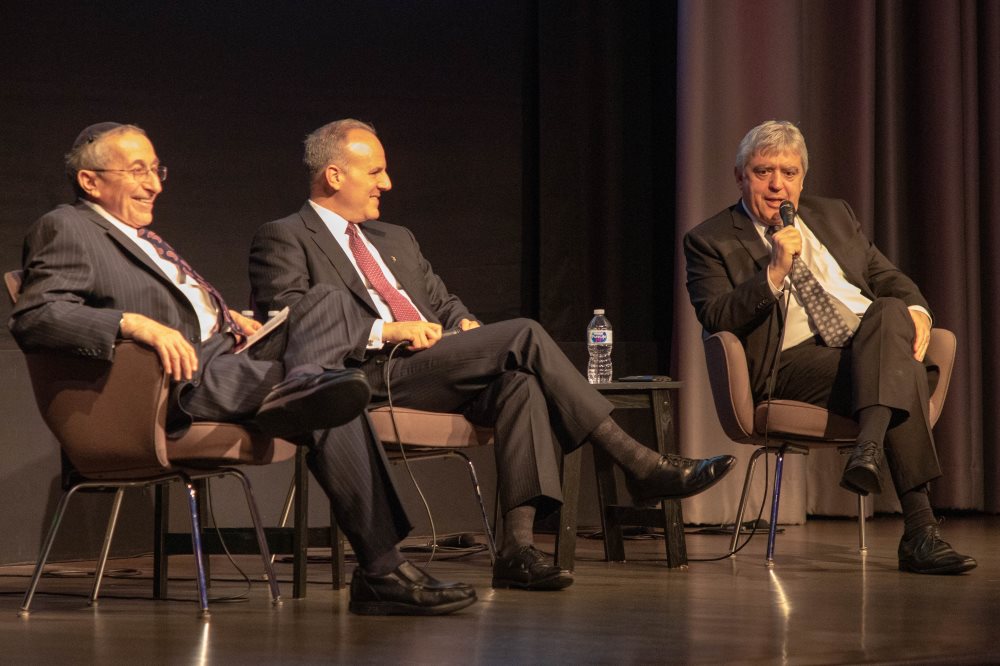 From left: Rabbi Marvin Hier, Elan Carr and David Suissa discuss anti-Semitism at the Museum of Tolerance. Photo by Jacob Jacoby
From left: Rabbi Marvin Hier, Elan Carr and David Suissa discuss anti-Semitism at the Museum of Tolerance. Photo by Jacob Jacoby Elan Carr believes the definition of anti-Semitism has evolved in today’s world.
“In the new anti-Semitism of today, anti-Zionism — whether it’s hatred of the State of Israel by Hamas or Hezbollah, Iran, or it’s hatred of the State of Israel by intellectual elites in Europe or on college campuses in the United States — anti-Zionism today is the fig leaf that justifies the most appalling and unvarnished anti-Semitism,” Carr said.
Carr, the recently appointed U.S. special envoy to monitor and combat anti-Semitism, spoke on March 14 at the Museum of Tolerance in Los Angeles, along with Rabbi Marvin Hier, founder and dean of the Simon Wiesenthal Center (SWC).
The event, a 75-minute discussion that included a Q-and-A with the crowd of about 300 people, featured David Suissa, publisher and editor-in-chief of the Jewish Journal, as its moderator, and focused on the rise of anti-Semitism around the world today. American Committee for Shaare Zedek Medical Center in Jerusalem organized the event with the U.S. Department of State, SWC and the Journal.
Examining the many forms of anti-Semitism, the three speakers discussed how the vilification on college campuses of people with privilege creates an anti-Semitic environment toward young Jewish people today.
“There is the view, and this is prevalent now on the left and certainly on college campuses, that privilege and power is the cause of social ills today,” Carr said.
Hier voiced his concerns about freshman Rep. Ilhan Omar (D-Minn.), one of two Muslim women elected to Congress last year. In tweets and in other public settings, Omar has said support for Israel is due to “the Benjamins,” referring to Founding Father Ben Franklin’s image on $100 bills, and that some American lawmakers’ support of Israel represents a “dual loyalty,” an assertion her critics have called anti-Semitic.
A resolution in the House of Representatives denouncing anti-Semitism and other forms of bigotry omitted Omar’s name, despite agreement among some of her colleagues that her remarks were anti-Semitic.
“What Congresswoman Omar is doing is very, very dangerous,” Hier said. “The fact that she was not condemned by name is an embarrassment.”
Suissa refuted the claim by Omar’s defenders that her statements were legitimate criticisms of the Israeli government. If they were not actually about ending the Jewish state altogether, they would lead to a debate about Israel’s policies, he said.
“Whenever I hear the anti-Semitism that’s hiding behind anti-Zionism, one of the things that frustrates me to no end, there’s never a debate on Israel,” Suissa said. “The comments from Ilhan Omar, the representative, has nothing to do with criticizing Israeli policies.”
“How do we combat anti-Semitism in a society where hate speech is not illegal?” Suissa asked.
Carr said the answer was Jewish unity. There is power when Jewish people stand together to denounce anti-Semitism, he said.
“Right-wing anti-Semitism, left-wing anti-Semitism, it doesn’t matter to me. Jew hatred is Jew hatred.” — Elan Carr
“We have a First Amendment but we have to meet hate speech with resounding, unequivocal condemnation,” Carr said. “When the Jewish community comes up and stands together, it changes the world.”
Hier spoke about his conversation with the king of Bahrain, “a chassid of Frank Sinatra,” he said. The Bahraini king ordered Sinatra recordings that had not arrived two months after he ordered them. The king learned that there had been an Arab boycott against Israel and that CBS, which then housed the recordings, was on the list.
“So he orders immediately that they should give him the records, and he says to these fellows, ‘I don’t believe in the boycott against Israel,” Hier said. “I intend to see we’re not boycotting Israelis.’ And right now, the king of Bahrain — you saw in the news the last three months — they want to make peace with Israel.”
Carr said his job in the State Department underscored that America cares about its Jews.
“Jews aren’t tolerated in the United States — we are loved in the United States,” Carr said. “We are, and it’s not perfect and, of course, there are people on the fringes and we have challenges and we’ve seen things in the last couple of weeks that are disturbing, but by and large, we are absolutely blessed.”
Whether fighting anti-Semitism on the left, where it often takes the form of bias against the Israeli government, or on the right, as was seen in 2017 in Charlottesville, Va., where neo-Nazis chanted against Jews during a rally, the Jewish people need to call out anti-Semitism, Hier said.
“We need to be fair on both sides,” Hier said. “I’m also a big critic on the right-wing, KKK, right-wingers that are sometimes accepted by the Republican Party or elements of the Republican Party. We should criticize them with straight talk in the same way that we should criticize any president of the United States that was going to Aretha Franklin’s funeral and is seated near Louis Farrakhan, the biggest anti-Semite in the United States of America.”
Hier was referring to former President Bill Clinton, who sat near the Nation of Islam leader at Franklin’s 2018 funeral.
“Right-wing anti-Semitism, left-wing anti-Semitism, it doesn’t matter to me. Jew hatred is Jew hatred,” Carr agreed. “We’re going to fight it no matter what ideological clothing it dresses itself in.”























 More news and opinions than at a Shabbat dinner, right in your inbox.
More news and opinions than at a Shabbat dinner, right in your inbox.